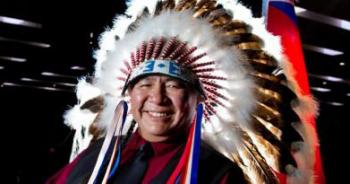Image Caption
Summary
Local Journalism Initiative Reporter
Windspeaker.com
Lee Crowchild believes that First Nations need strong leadership now at the tail end of the coronavirus pandemic, and with the recent location of the remains of many hundreds of children in unmarked and undisclosed grave sites at former residential schools in Canada.
Leadership is not about being a politician or being a crusader Crowchild said. A politician knows the right words to say, but doesn’t offer a strong response to an issue, he explained, while a crusader is someone willing to be sacrificed, with many lined up behind him to be sacrificed next.
“A really strong leader, a traditional leader, will stand up with their conviction.”
Being chief is a position Crowchild said he was mentored to do all his life, as a third-generation chief behind his grandfather and father. He served a single term as chief for Tsuut’ina Nation in Alberta, elected in 2019.
He says he always wanted to be chief, but was told by the Elders it wasn’t yet his time. He led in other ways, including holding several management positions with the Tsuut’ina Nation as well as advocating for environmental responsibility, economic diversification and for First Nations to develop and practise their own emergency response plans.
Crowchild sees the role of national chief as one that would allow him to “ignite the fire” in the grassroots, the voice of which is growing louder, he said. As well, it provides tools to chiefs to do the work they deem necessary.
“In terms of leadership, I'm opening the door for the chiefs to open doors further so they can talk with government. (I’m) opening doors to talk to the ministers and all those that need to be heard,” he said.
As for dealing with the federal government, Crowchild understands the charge leveled against so many national chiefs that they get too cozy with the federal government of the day.
“When you've been a chief for a long time and you've learned how to navigate, how to interact with government, you can't help but be changed because a lot of times you’re in a position of compromising,” he said.
However, he says while he’s “about building bridges” he’s also about truth-telling.
“I'm known for it in my one term as chief… I just called things for the way they are,” Crowchild said. And he promised to continue to do that.
Crowchild said work needs to begin now with talks with the federal government that will get First Nations out from under the Indian Act. Part of that preparation comes by educating young adults from First Nations communities both at university and in traditional knowledge.
Crowchild sets as a priority revisiting the AFN charter through discussion driven by chiefs, pointing out that “change is always dynamic. It always has to happen.”
Crowchild wants to ensure that all chiefs have a voice, whether they have pre-confederation treaties, peace and friendship treaties, numbered treaties, modern day treaties or are from the West Coast, and that will only come through changes to the charter, he said.
“Then we find the commonalities and work together because that's a big task…It's something worth talking about because you don’t want to take from one (group of chiefs) so you can please another,” said Crowchild.
Economic development is another priority. He points to work he did in Tsuut’ina Nation with the creation of a business charter that separated politics from economics and provided businesses with certainty. Economic development is necessary for First Nations when “we're talking sovereignty,” he said, and addresses such issues as jobs, education, health and clean drinking water.
A “nation-wide healing pathway” for men is another priority, said Crowchild, who points out that addictions take men away from being fathers and the cycle keeps repeating itself.
“Our men are hurting. Our fathers are broken. We need to have a program for bringing them all together…. We need to come up with a way to break that broken chain of fatherhood,” he said.
Crowchild believes that rebuilding family systems, including a kinship family where other males—young men, uncles, grandfathers—play a role in the absence of the father might also work in breaking the chain of violence against women.
“One of my other platforms is bringing the voice of our women chiefs. Our women chiefs need to be heard and that’s what they’ve been asking for all along but we’ve never been able to do that…. Our backbone is still our women. It's giving back the responsibility to the women chiefs to help guide us,” said Crowchild.
Also running for the position of national chief are RoseAnne Archibald, Reginald Bellerose, Alvin Fiddler, Kevin Hart, Cathy Martin and Jodi Calahoo Stonehouse.
“Whoever ends up being the national chief I hope they take on the responsibility of working with the other candidates. Everybody has a good notion of where the nation should go,” said Crowchild.
The virtual election for national chief will take place July 7.
Local Journalism Initiative Reporters are supported by a financial contribution made by the Government of Canada.

